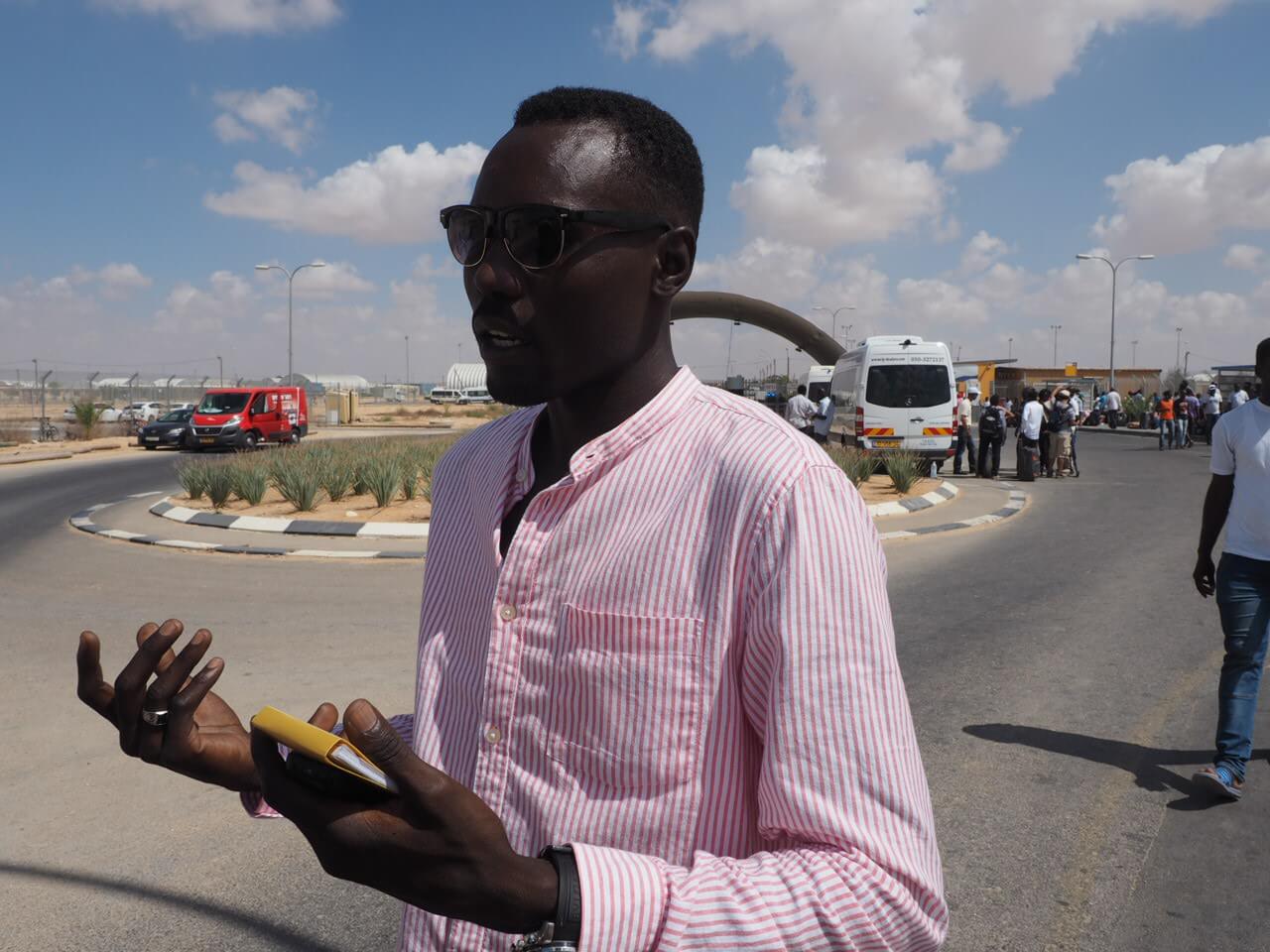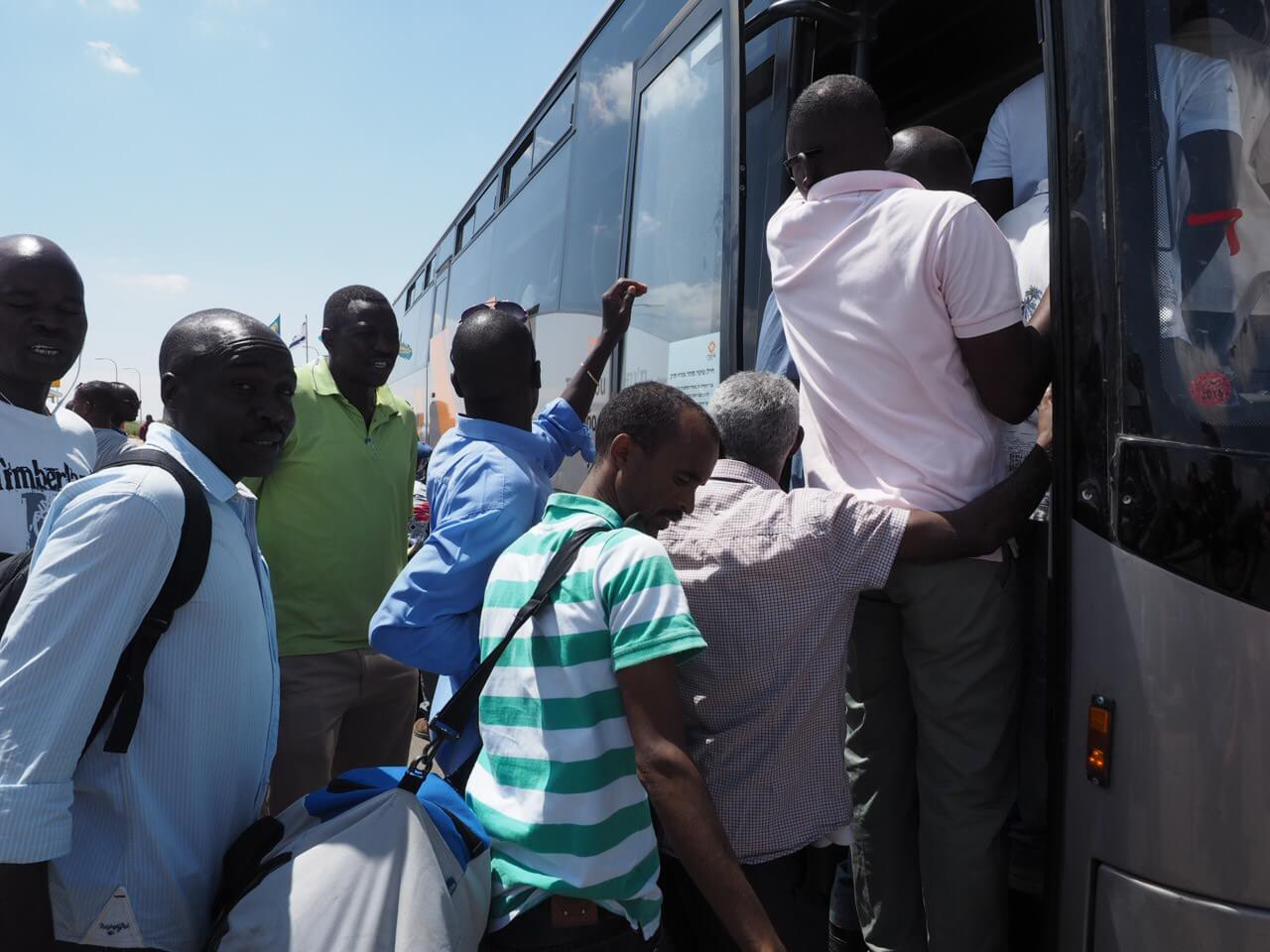Nearly 1,200 Sudanese and Eritrean asylum seekers were released from Israel’s Holot detention center on Tuesday and Wednesday after the High Court ruled that asylum seekers could not be held for more than one year. Interior Minister Silvan Shalom barred the released asylum seekers from living or working in Tel Aviv and Eilat where their communities are based, effectively leaving them without a place to sleep and slim chances of earning income.
Though the Ministry of Interior offered no explanation for the decision, it is the latest move to make life intolerable in order to coerce African refugees to leave Israel.
On his Facebook page, Interior Minister Silvan Shalom wrote on Sunday afternoon: The 1,200 infiltrators that will be released from Holot will not be permitted to reach Tel Aviv and Eilat. This is the first part of a solution to the complex problem of releasing infiltrators for the rest of the week. We will surely provide a better and more comprehensive response in the next two weeks.
While asylum seekers scrambled to arrange places to sleep, many boarded buses to cities like Be’er Sheva with no plans beyond their arrival. “We don’t have any place to sleep, but we’ll see what happens,” one man told me as he boarded a bus to Be’er Sheva.

Darfurian refugee Hasan Tom, 27, could not celebrate his release from Holot after 18 months of imprisonment. “It’s a very strange feeling,” he said. “I know that I’m getting out [of Holot] but the bigger feeling is that I don’t know where to go or what to do. What is waiting for me after this?”
Upon release from Holot, the asylum seekers received a temporary visa valid for two months stipulating the ban from Tel Aviv and Eilat. Tom initially refused because he would not be allowed to return to the apartment he and his partner, a Palestinian woman with Israeli citizenship, have been living in since before he was imprisoned in Holot. “It’s home to me – it’s the only shelter I have,” he said.
Without a visa and out of Holot, representatives from the Ministry of Interior threatened Tom, he said, telling him he would be sent to Saharonim, the nearby prison which jails some asylum seekers as well as Palestinian political prisoners. “This isn’t complete freedom. Freedom means you can go wherever you want,” he remarked.
After consulting a lawyer, Tom opted to accept the visa and is now staying with other Sudanese refugees in the coastal suburb of Netanya, a short commute to his partner’s Tel Aviv apartment.
After almost two years of waiting to find out what awaits them, the High Court’s ruling and Interior Minister’s ban struck a severe blow to the hopes of many asylum seekers. “I don’t even know where I can go,” said Darfurian refugee Sabon Ahmad Hassan, 20. “I can get arrested again. There is no safe place. If I could stay in Tel Aviv, I’d have several places to stay. I didn’t think it would be like this. This isn’t freedom, this is misery.”
For Hassan, the precarious position the recently-released asylum seekers are now in revealed what he saw as a deep truth about Israel. “This is not a democracy. In democratic countries they aren’t allowed to do this to you.”
By Wednesday evening, Hassan ended up in Yavne, a coastal city an hour’s drive south of Tel Aviv, and is searching for employment.
As buses carrying asylum seekers dispersed on Tuesday, the mayor of the Negev city of Arad, Nissan Ben Hamu, announced on Facebook that he ordered police to erect checkpoints to prevent their entry. He went on to incite vigilante violence against asylum seekers, writing, “If we have to strengthen our struggle on this issue I won’t hesitate to call on all residents to join in the fight for the city’s well-being.”
A handful of asylum seekers were briefly detained and released by city inspectors. The mayor’s Facebook post was dismissed as a public relations stunt by an Arad city council member, according to +972.
Vans from resorts near the Dead Sea came to collect newly-released asylum seekers for labor jobs. Others went to the coastal city of Ashdod where they hope to find employment.

With thanks to David Sheen for translation.



A most cruel, racist, and evil action. Israel is breaking international law and humanitarian law all the time. They are party to the Convention on Refugees, but apparently they don’t give a darn. Why should they? Nobody every holds them accountable. This is criminal, imho. The inciting mayor of Arad was only following the lead of the GoI. The word “infiltrators” is repugnant, btw.
“Published August 18, 2015
Exclusive: Despite dangers, Israel sending asylum seekers to home countries
For the first time, new statistics reveal that nearly 4,600 Sudanese and 1,000 Eritreans were sent back to their countries of origin, possibly against international law. Israel’s Interior Ministry claims they are returning ‘voluntarily.’ A +972 Magazine exclusive.
By Oren Ziv
Israel has been sending thousands of African asylum seekers back to their home countries as part of a plan for “voluntary return.” According to new statistics, which are being published here for the first time, most of the returnees have been sent back to their countries of origin — Sudan and Eritrea — rather than “third countries,” in accordance with Israel’s previously-announced arrangement, which would ostensibly ensure their safety.
According to Interior Ministry numbers revealed following a freedom of information request by Dr. Gilad Liberman and Attorney Itay Mack, and were passed on to +972, 4,608 asylum seekers have been sent back to Sudan, while 1,059 have been sent back to Eritrea. Over 4,200 asylum seekers have been sent to third countries, of which 2,600 are Sudanese and Eritrean. The vast majority of Sudanese asylum seekers who have left Israel were returned to Sudan.
The Sudanese government has committed genocide in Darfur, as well as political and ethnic persecution in other parts of the country. Eritrea is under the control of a tyrannical military regime, which forcefully enlists its citizens into the army for long periods of time or puts them in forced labor, while women are forced to serve as sex slaves for soldiers. Citizens from both Sudan and Eritrea are considered “protected groups” — a status that forbids the Israeli government from returning them to their home countries.
In response to the findings, the Office of the United Nations High Commissioner for Refugees (UNHCR) stated that while Sudanese and Eritrean citizens have the full right to voluntarily return to their country — their return is recognized only when the returnee has a valid visa and earns a living. “However, leaving the country is not an alternative to detention and — as a response to any denial of rights — does not count as voluntary, and could even be considered illegal deportation according to both Israeli and international law, which endangers the life and safety of the returnee.”
In the past, UNHCR has said that “deporting Sudanese to Sudan constitutes a severe contravention of the [refugee] convention Israel has signed on to.”
Due to the dangers facing asylum seekers in their homeland, not a single European country has deported them to Eritrea or Sudan. Even asylum seekers who are not granted refugee status can remain in those countries, pursuant to the policy of non-return, which is anchored in the 1951 Refugee Convention.
Israel’s Administration of Population and Immigration has yet to respond to the above claims.
Breaking their spirits
Asylum seekers living in Israel are in constant threat of being jailed for long periods of time at the Holot detention center. Just a week ago, Israel’s High Court approved the latest version of the “anti-infiltration law,” which allows the state to imprison asylum seekers in Holot for a period of a year.
According to President of the High Court Miriam Naor’s ruling, the state has no intention of “breaking the spirit” of the asylum seekers and does not encourage them to leave, while they are eligible for protection from deportation. In response to the High Court ruling, Minister Gilad Erdan published a Facebook status [Hebrew], which revealed the true intention of the law: to break the asylum seekers’ spirits so that they return to their home countries. “The 20 months in Holot detention center…(is intended) to create an incentive for them to return to their countries of origin.”
“Many of the voluntary ‘returnees’ to their country of origin, who return despite the heavy risks entailed to their lives and freedom, are refugees whom Israel was able to break their spirits through detention and abuse,” says Mack. “Choosing their home country over a third country is not a confirmation that the asylum seeker feels that he or she is safe there.”…”
much more @- http://972mag.com/exclusive-israel-deports-most-asylum-seekers-to-home-countries-where-they-face-death-or-prison/110614/
Thanks for the article, Dan and David.
It’s plain to me why Israel is taking this harsh position on the African refugees. They know all too well how a small group of immigrants and refugees can take over a country because that’s how they took over Palestine. These refugees are not Jewish and black which is a double strike against. The “nightmare” scenario is that 60,000 will grow to 100,000 then 150,000. And what’s to stop them from marrying Jews and raising thousands of dark skinned kids who won’t vote Likud or go into the army! Personally I hope these immigrants can lay the foundation for the death knell of Zionism, Since it has been nothing but a disaster for the Jews and Palestinians.
I have to admit I am not in favor of allowing an endless flow of undocumented Africans to illegally enter Europe looking for a better life, bringing misery to nations already struggling with economies on the verge of collapse. Italy alone is absorbing thousands each week, to be supported by taxpayers already taxed to death. Shame on the rich Arab nations for not opening their doors and coffers to their own brothers in need.
Having said that, I agree that nobody, especially women and children, escaping torture, rape and death should be turned away from whatever shore they manage to reach, and I find Israel, which prides herself, and often boasts, of being the first on the ground providing assistance whenever disaster strikes in the world, to be severely lacking in compassion towards those seeking help on her own shores. And I, too, am outraged at their referring to these poor dispossessed people as ‘infiltrators’ – a negative term usually associated with espionage or similar nefarious activities. Certainly not the case here, but I guess it serves to ease their conscience. Not too different from calling all Palestinians terrorists, to justify their treatment of them, at least in their own eyes.
“As buses carrying asylum seekers dispersed on Tuesday, the mayor of the Negev city of Arad, Nissan Ben Hamu, announced on Facebook that he ordered police to erect checkpoints to prevent their entry. He went on to incite vigilante violence against asylum seekers, writing, “If we have to strengthen our struggle on this issue I won’t hesitate to call on all residents to join in the fight for the city’s well-being.”
The mayor of Arad won’t hesitate to call up a lynch mob.
I fear more now for the asylum seeker’s safety than ever.
And this is Israeli democracy in action.
“Israel Changes Criteria: Most Eritrean or Sudanese Can Be Detained at Holot
Former criteria stipulated that any Sudanese citizen that entered Israel before December 2011 (in place of May 2011 before that) could be detained; and likewise for Eritreans who crossed the border before July 2011 (formerly May 2009).
The Population, Immigration and Border Authority has altered its criteria and will now be able to summon any Eritrean or Sudanese citizen to the Holot detention facility, Haaretz has learned Thursday, regardless of how much time they’ve been in Israel. The decision comes after a court ruling freed over 1,000 asylum seekers who spent more than a year at the detention facility.
Until now, the authority determined that only asylum seekers who have been in Israel for long periods of time could be taken to the facility. However, beginning at the end of the month, the government will be able to limit the freedom and movement of any Eritrean or Sudanese citizen, excluding asylum seekers who have already spent over a year at Holot. …”
read more: http://www.haaretz.com/news/israel/.premium-1.673289?utm_source=dlvr.it&utm_medium=twitter
The Occupation/Prison/Apartheid state.